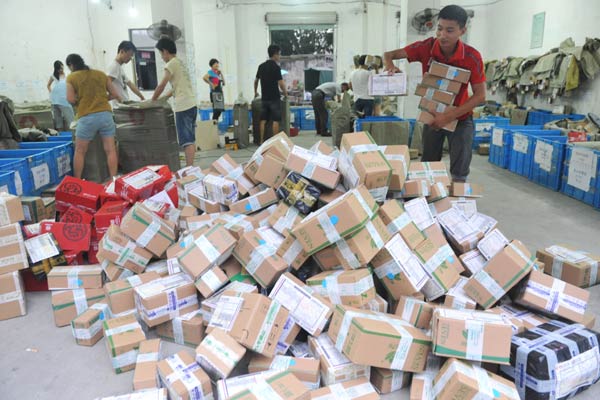China sets new online import tax rules
Xinhua, March 28, 2016 Adjust font size:
China will change the tax rules on online retail goods from April 8 to level the playing field for e-commerce platforms and traditional retailers and importers.
Retail goods purchased online will no longer be classified as "parcels," which enjoy a "parcel tax" rate, lower than that on other imported goods. Instead, online purchases from overseas will be charged in the same way as any other imported goods, the Ministry of Finance (MOF) announced on Thursday.
|
|
|
Workers at a delivery service sort parcels in Hangzhou, Zhejiang province. [File photo / China Daily] |
"Parcel tax is not for trade purposes, which is exactly what online retailing is. It is unfair to conventional importers and domestic producers," said Zhang Bin of the Chinese Academy of Social Sciences.
China levies parcel tax on imported goods worth less than 1,000 yuan (150 U.S. dollars), and the rates is mostly 10 percent. Taxes under 50 yuan are waived. As demand for overseas goods grows, online purchasing agents have taken advantage of parcel tax and used new methods such as repackaging and mailing products separately to avoid tax.
The new policy only allows a maximum of 2,000 yuan per single cross-border transaction and a maximum of 20,000 yuan per person per year. Goods that exceed these limits will be levied the full tax for general trade, the MOF said.
According to a 2015 survey by Amazon China on online imports, most buyers are under 35 and around 90 percent have a college education. More than half earn more than 5,000 yuan per month.
The new policy will speed up customs clearance so consumers will receive most orders from overseas within two weeks, instead of the current two months.
Cross-border e-commerce has been booming in China. The country plans to set up more cross-border e-commerce pilot zones to attract businesses, create jobs and nurture new business models that will boost foreign trade and stimulate the economy, the State Council announced in January.
The expansion of the pilot zones came at a time when the country is facing sluggish foreign trade. Total export and import value for 2015 decreased 7 percent year on year, falling for the first time in six years.
The Ministry of Commerce predicted the volume of cross-border e-commerce in 2016 will reach 6.5 trillion yuan and will soon account for 20 percent of China's foreign trade.
